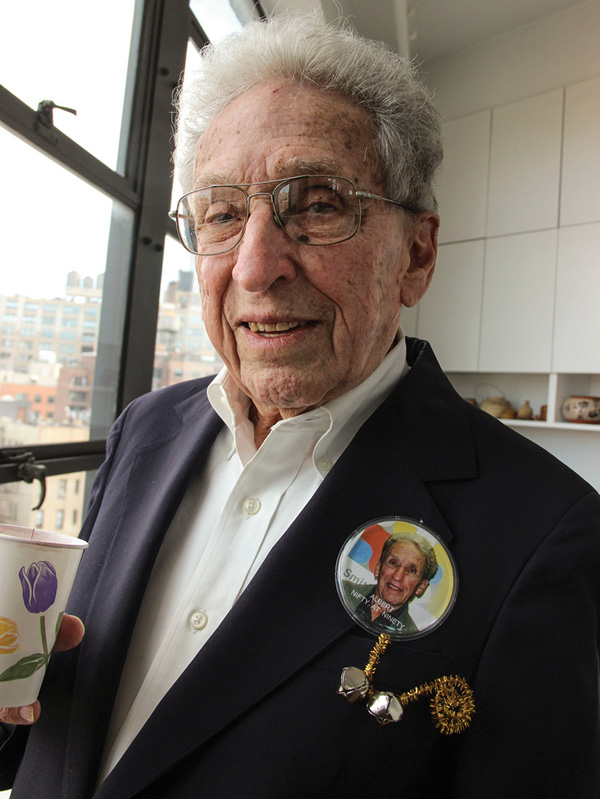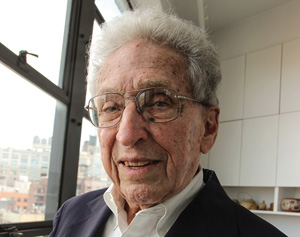BY ALBERT AMATEAU | Albert S. Bennett, a longtime Morton St. resident, has been by turns a musician, a theatrical agent, an editor and an actor. But his greatest satisfaction has been his advocacy for his block and for the greater Greenwich Village neighborhood.
Bennett’s friends and neighbors gathered on a recent Saturday afternoon to celebrate his many careers and his long and passionate devotion to the preservation of the Village.
The event was also a celebration of two upcoming milestones for Bennett: his 90th birthday in July and, on Sept. 1, the 60th anniversary of his moving to Morton St.
Mary Phillips, who served as toastmaster at the gathering in the Morton St. apartment of Tom and Ellen Stevenson, cited Bennett as a founder of the revived Morton St. Block Association 22 years ago. She chronicled his relentless efforts to extend the Greenwich Village Historic District and to preserve the waterfront. In 2010, Bennett won a Village Award from the Greenwich Village Society for Historic Preservation, she noted.
“He calls himself a tyrant, because no matter how careful I am, he always finds a typo in the Morton Street News, the block association newsletter,” Phillips said. “If so, he’s the most beloved tyrant in the world,” said Phillips, editor of the newsletter.

Bennett also contributed to “Maritime Mile: The Story of the Greenwich Village Waterfront,” by Stuart Waldman and Zack Winestine, a book about the Hudson waterfront between Canal and 14th Sts., published in 2002.
“Albert wrote the captions for the photos — and the book is mostly photos and captions,” Phillips said.
Bennett told a visitor from The Villager the story of how he found his home in the four-story row house on Morton St.
“There was a ‘for rent’ notice for the apartment in the ladies’ room at J. Walter Thompson,” he recalled. “I was working at the ad agency and someone who knew I was looking for a place showed it to me.
“The building used to be a brothel known as the Town House,” he said. “It had a plaque on the front door. It was a very distinguished whorehouse that began during Prohibition and lasted until the end of World War II. The madam was Idetta de Renais — I don’t know what her real name was. The story is that she died around 1945 and left the building to her favorite girl, whose name was Mary Duggan, best as I remember.
“By the time I got there in 1955, the building was owned by N.A. Bruno, a landlord who had other properties in the Village. My building at 40 Morton dates from 1854; it’s in the Anglo-Italianate style, an unusual architectural style,” he said.
Bennett, born and raised in East Bay, a suburb of San Francisco, played the organ as a teenager for a local church. He went to the University of California at Berkeley for a year but was drafted into the Army in 1943. He was sent to the Pacific as a chaplain’s assistant (“because I played the organ”) and was on Okinawa during the last battle. Discharged in 1946, Bennett completed his undergraduate degree at Berkeley and then went to the Yale Graduate School of Drama.
“My first job in New York out of Yale was as an intern for Audrey Wood, reading plays,” Bennett said. “She was one of the most important theatrical agents in town. Playwrights like Tennessee Williams and William Inge were her clients.”
By the mid-1950s, Bennett was at J. Walter Thompson, working as a story editor for the Kraft Television Theater, a program that the ad agency produced. A long career editing reference books followed, first at the American Heritage Dictionary and then at the Funk & Wagnalls Encyclopedia, where he edited the annual yearbook.
“I retired as soon as I could and tried to be an actor,” he said. “I was able to get occasional jobs, winding up on ‘Law & Order’ a few times. But it got to a point where I couldn’t remember lines anymore and I decided to call an end to that career.”
Theater folk seem to be prominent among Morton St. residents.
Erwin Lerner, a guest at the Bennett gathering, is a playwright whose one-acts “Dilemma,” “Happy New Year Love” and “Tea” have appeared Off Broadway. He told a visitor how he first met his wife, who lived in the same building.
“I opened the shutters one morning, and there she was in the window across the courtyard,” Lerner said. “We’ve been together ever since.”
Elliot Levine, who turned 90 recently, is an actor with many credits.
“I played the old Shakespearian actor in ‘The Fantasticks’ at the Sullivan St. Playhouse in 1978,” Levine said. “The two things I liked best were the role — I loved the old Shakespearian actor — and the fact that it was only a five-minute walk from home to the theater.”
Responding to the tributes from his Morton St. neighbors about his preservation achievements, Bennett said, “I couldn’t have done it without all of you. This is the most important thing I’ve done. This is my legacy. Who could ask for anything more?”


































